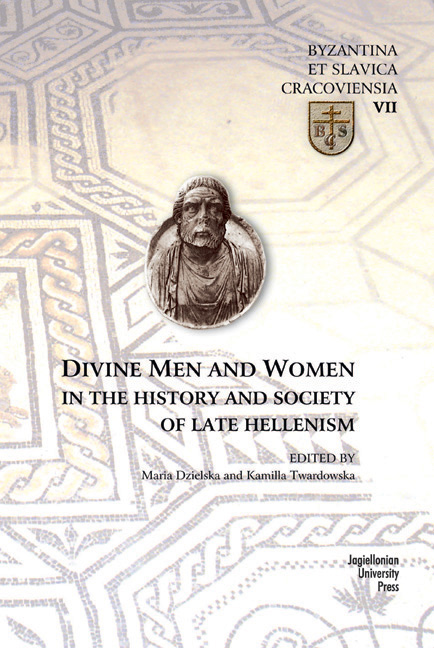Book contents
- Frontmatter
- Contents
- Foreword
- Introduction
- List of participants
- The Divine Man of Late Hellenism: A Sociable and Popular Figure
- Praying, Wonder-Making and Advertising: The Epitynchanoi's Funerary Inscriptions
- Philosophy and Culture as Means to Divine Ascent in Late Antiquity: The Case of Synesius
- Once More on Hypatia's Death
- Boethius — Divine Man or Christian Philospopher?
- Aspects of Divinization According to Farīd-al-dīn ʿAṭṭār Nīšāpūrī (died c. 1221)
- Lecture Halls at Kom el-Dikka in Alexandria
- Salustios — Divine Man of Cynicism in Late Antiquity
- Sosipatra — Role Models for ‘Divine’ Women in Late Antiquity
- Athenais Eudocia — Divine or Christian Woman?
- Damascius' Isidore: Collective Biography and a Perfectly Imperfect Philosophical Exemplar
- Conference photo gallery
Aspects of Divinization According to Farīd-al-dīn ʿAṭṭār Nīšāpūrī (died c. 1221)
Published online by Cambridge University Press: 05 December 2014
- Frontmatter
- Contents
- Foreword
- Introduction
- List of participants
- The Divine Man of Late Hellenism: A Sociable and Popular Figure
- Praying, Wonder-Making and Advertising: The Epitynchanoi's Funerary Inscriptions
- Philosophy and Culture as Means to Divine Ascent in Late Antiquity: The Case of Synesius
- Once More on Hypatia's Death
- Boethius — Divine Man or Christian Philospopher?
- Aspects of Divinization According to Farīd-al-dīn ʿAṭṭār Nīšāpūrī (died c. 1221)
- Lecture Halls at Kom el-Dikka in Alexandria
- Salustios — Divine Man of Cynicism in Late Antiquity
- Sosipatra — Role Models for ‘Divine’ Women in Late Antiquity
- Athenais Eudocia — Divine or Christian Woman?
- Damascius' Isidore: Collective Biography and a Perfectly Imperfect Philosophical Exemplar
- Conference photo gallery
Summary
Farīd ad-dīn ʿAṭṭār (ca 1145/6–1221) is to be accounted amongst the greatest Sufi poets and philosophers of Medieval Persia. Unfortunately he is less well know than Ğalāl ad-dīn Muḥammad Rūmī (1207–1273) and Muḥammad Hāfez-e Šīrāzī (1315–1390). Although Aṭṭār was overshadowed by his great successors now a-days he is still discovered and recognized as one of the canonical masters of Sufi thought. ʿAṭṭār who left an overwhelming influence on Persian misticism in reality was called Abū Hamīd bin Abū Bakr Ibrāhīm but today is better known by his pen-names Farīd al-Dīn and ʿAṭṭār — “the pharmacist”.
a) ʿAṭṭār's life
Reconstruction of ʿAṭṭār's life is very difficult because we do not possess enough reliable facts on his biography. Information on ʿAṭṭār's life is rare by his contemporaries. He is mentioned only by Moḥammad ʿAwfī (d. after 1223) and Ḵᵛāja Naṣīr ad -dīn Ṭūsī (1200–1273). In principle ʿAṭṭār tells us very little about himself. His works contain isolated allusion to contemporary persons or political events preferring a timeless world of mysticism. It is understood when we take into consideration that all his works are a religious nature concentrating reader's attention on spiritual subjects and having little occasion for biographical references. The only biographical date appears in ʿAṭṭār's writings, namely 1177 (573 Š.) as the year of his completion of the Manṭeq aṭṭayr (The Conference of Birds) cannot be taken as conclusive evidence because the verse in question was not found in all the manuscripts.
- Type
- Chapter
- Information
- Publisher: Jagiellonian University PressPrint publication year: 2013



